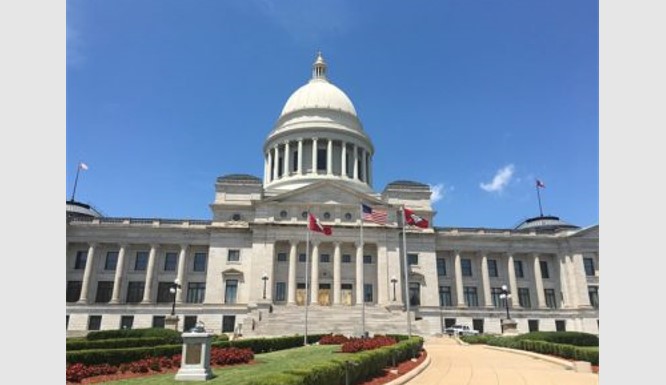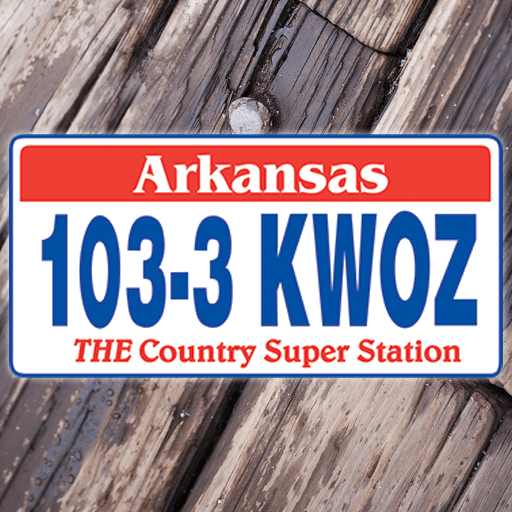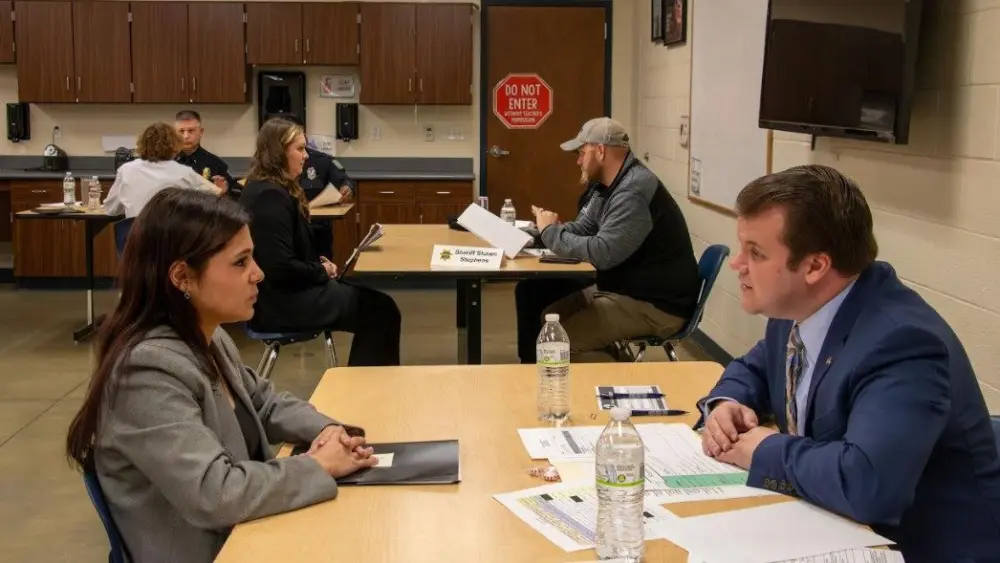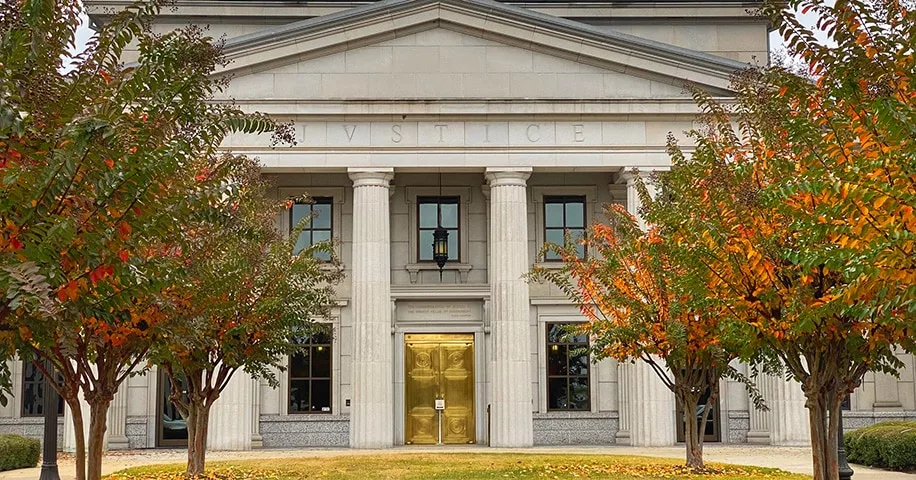
Half of all Arkansas children in rural areas were on Medicaid or CHIP in 2023
By Tess Vrbin , Arkansas Advocate
Arkansas was among the 10 states with the most children in rural areas relying on Medicaid for health insurance in 2023, and was one of only six with more than half of its rural children on Medicaid, according to a report released Wednesday by the Center for Children and Families at Georgetown University’s McCourt School of Public Policy.
The jointly funded state and federal health insurance program serves approximately 80 million people nationwide. Children and non-elderly adults in rural counties, defined as having no urban area with a population of more than 50,000 people, are more likely to rely on Medicaid and the Children’s Health Insurance Program (CHIP) to afford health care, the report found.
Nationwide, 40.6% of children in rural areas were Medicaid recipients in 2023, compared to 38.2% of children in metropolitan areas, according to the report. Rural non-elderly adults comprised 18.3% of Medicaid recipients, two percentage points higher than in metropolitan areas.
Proportions of rural and urban Medicaid recipients matter because rural areas have fewer healthcare resources, the report’s authors said in a virtual conference call Wednesday morning.
Researchers built the report on data from the U.S. Census Bureau’s American Community Survey, an annual nationwide collection of demographic data, Georgetown public policy research professor and report co-author Joan Alker said.
However, this survey tends to undercount Medicaid recipients, so the report’s “estimates are conservative” and the actual numbers may be higher, Alker said.
The Census Bureau recorded Arkansas’ population as slightly more than 3 million in 2020 (though this number was an undercount). Statewide, 27.7% of rural Arkansans were on Medicaid in 2023, compared to 24.4% of urban Arkansans, the report stated.
The same year, the state Department of Human Services disenrolled more than 184,500 Arkansans whose Medicaid coverage was extended due to the COVID-19 pandemic and who did not provide necessary information to determine whether they were still eligible for the program.
As of Dec. 1, 2024, nearly half of the 863,117 Arkansans on Medicaid were children, according to DHS data. In 2023, 78,506 Arkansas children were disenrolled from Medicaid, according to a U.S. Department of Health and Human Services request that the state re-enroll eligible children later that year.
Half of all Arkansas children in rural areas were on Medicaid or CHIP in 2023, the ninth-highest number among all 50 states and Washington D.C., according to Wednesday’s report.
The report comes less than a week after Politico reported that U.S. Congressional Republicans are considering $2.3 trillion in Medicaid cuts, nearly one-third of the program’s current projected spending over the next decade. In practice, some of the proposed cuts would cap per-state Medicaid spending based on population and impose work requirements on Medicaid recipients.
Medicaid is “a very lean program” and “the lowest payer” in the healthcare system, and the proposed cuts would leave rural communities “devastated,” said Anne Dwyer, a Georgetown associate research professor who moderated Wednesday’s conference call.
She noted that Republican President-elect Donald Trump and his 2024 Democratic opponent, Kamala Harris, did not make Medicaid a priority while campaigning for the presidency.
“It’s a very popular program with voters of all political stripes,” Dwyer said. “…As vital as Medicaid is everywhere, it’s even more vital in rural communities, which face greater challenges already to maintain a thriving health system.”
Cutting Medicaid spending could force healthcare providers in rural areas to stop serving Medicaid recipients because they could not afford to stay in business, said Benjamin Anderson, the president and CEO of the Hutchinson Regional Healthcare System in rural Kansas.
Rural Americans, including in Arkansas, largely supported Trump in November’s election. When asked if rural voters did not understand that they were supporting a candidate whose party supports reducing their access to health care, Anderson said the general public does not necessarily understand Medicaid well enough to make such a connection.
“People in rural America value relationships even over logic, even over data,” Anderson said. “They have to trust their source, so I think there’s an opportunity for local community leaders that have [that] trust with people to be able to educate at a grassroots level. That’s not easy work.”
The revenue generated by the proposed Medicaid cuts likely would support tax cuts, which disproportionately benefit wealthy Americans, Alker said. Trump signed the Tax Cuts and Jobs Act in 2017 during his first term, and the law is set to expire at the end of 2025.
Arkansas Gov. Sarah Huckabee Sanders, who served as Trump’s White House press secretary, and Senate President Pro Tempore Bart Hester, a Republican from Cave Springs, have both publicly supported income tax cuts and work requirements for Medicaid recipients. Hester told the Advocate in December that lawmakers should ensure Medicaid is serving “the most vulnerable” rather than people who “refuse to work or find it inconvenient.”
Arkansas was among the 10 states with the most children in rural areas relying on Medicaid for health insurance in 2023, and was one of only six with more than half of its rural children on Medicaid, according to a report released Wednesday by the Center for Children and Families at Georgetown University’s McCourt School of Public Policy.
The jointly funded state and federal health insurance program serves approximately 80 million people nationwide. Children and non-elderly adults in rural counties, defined as having no urban area with a population of more than 50,000 people, are more likely to rely on Medicaid and the Children’s Health Insurance Program (CHIP) to afford health care, the report found.
Nationwide, 40.6% of children in rural areas were Medicaid recipients in 2023, compared to 38.2% of children in metropolitan areas, according to the report. Rural non-elderly adults comprised 18.3% of Medicaid recipients, two percentage points higher than in metropolitan areas.
Proportions of rural and urban Medicaid recipients matter because rural areas have fewer healthcare resources, the report’s authors said in a virtual conference call Wednesday morning.
Researchers built the report on data from the U.S. Census Bureau’s American Community Survey, an annual nationwide collection of demographic data, Georgetown public policy research professor and report co-author Joan Alker said.
However, this survey tends to undercount Medicaid recipients, so the report’s “estimates are conservative” and the actual numbers may be higher, Alker said.
The Census Bureau recorded Arkansas’ population as slightly more than 3 million in 2020 (though this number was an undercount). Statewide, 27.7% of rural Arkansans were on Medicaid in 2023, compared to 24.4% of urban Arkansans, the report stated.
The same year, the state Department of Human Services disenrolled more than 184,500 Arkansans whose Medicaid coverage was extended due to the COVID-19 pandemic and who did not provide necessary information to determine whether they were still eligible for the program.
As of Dec. 1, 2024, nearly half of the 863,117 Arkansans on Medicaid were children, according to DHS data. In 2023, 78,506 Arkansas children were disenrolled from Medicaid, according to a U.S. Department of Health and Human Services request that the state re-enroll eligible children later that year.
Half of all Arkansas children in rural areas were on Medicaid or CHIP in 2023, the ninth-highest number among all 50 states and Washington D.C., according to Wednesday’s report.
The report comes less than a week after Politico reported that U.S. Congressional Republicans are considering $2.3 trillion in Medicaid cuts, nearly one-third of the program’s current projected spending over the next decade. In practice, some of the proposed cuts would cap per-state Medicaid spending based on population and impose work requirements on Medicaid recipients.
Medicaid is “a very lean program” and “the lowest payer” in the healthcare system, and the proposed cuts would leave rural communities “devastated,” said Anne Dwyer, a Georgetown associate research professor who moderated Wednesday’s conference call.
She noted that Republican President-elect Donald Trump and his 2024 Democratic opponent, Kamala Harris, did not make Medicaid a priority while campaigning for the presidency.
“It’s a very popular program with voters of all political stripes,” Dwyer said. “…As vital as Medicaid is everywhere, it’s even more vital in rural communities, which face greater challenges already to maintain a thriving health system.”
Cutting Medicaid spending could force healthcare providers in rural areas to stop serving Medicaid recipients because they could not afford to stay in business, said Benjamin Anderson, the president and CEO of the Hutchinson Regional Healthcare System in rural Kansas.
Rural Americans, including in Arkansas, largely supported Trump in November’s election. When asked if rural voters did not understand that they were supporting a candidate whose party supports reducing their access to health care, Anderson said the general public does not necessarily understand Medicaid well enough to make such a connection.
“People in rural America value relationships even over logic, even over data,” Anderson said. “They have to trust their source, so I think there’s an opportunity for local community leaders that have [that] trust with people to be able to educate at a grassroots level. That’s not easy work.”
Work requirements and maternal health resources
The revenue generated by the proposed Medicaid cuts likely would support tax cuts, which disproportionately benefit wealthy Americans, Alker said. Trump signed the Tax Cuts and Jobs Act in 2017 during his first term, and the law is set to expire at the end of 2025.
Arkansas Gov. Sarah Huckabee Sanders, who served as Trump’s White House press secretary, and Senate President Pro Tempore Bart Hester, a Republican from Cave Springs, have both publicly supported income tax cuts and work requirements for Medicaid recipients. Hester told the Advocate in December that lawmakers should ensure Medicaid is serving “the most vulnerable” rather than people who “refuse to work or find it inconvenient.”
Sanders and DHS Secretary Kristi Putnam sought a federal waiver in 2023 requiring work or volunteering for able-bodied adults to receive the full package of Medicaid expansion services. Republican leaders in other states have proposed similar policies.
“While I think we all have an interest in supporting work, this policy is a mistake [and] it’s misguided,” Alker said Wednesday.
Under the Medicaid expansion program proposed in DHS’ waiver request, able-bodied adults who do not work, volunteer, go to school or receive workforce training would receive fee-for-service Medicaid coverage instead of a qualified health plan. The proposal is not expected to cut any Arkansan from Medicaid coverage entirely, unlike the state’s 2018 work requirement that was struck down in court after 180,000 people lost coverage.
Qualified health plans meet the federal Affordable Care Act requirement for “minimum essential coverage” and follow federal limits on deductibles, copayments and out-of-pocket maximum amounts. Under fee-for-service coverage, the state pays health care providers for services rendered.
Valuing “hard work and human dignity” is “part of the culture of Middle America,” and barriers to health care clash with those values, Anderson said.
“Working people who get sick, whose kids get sick, and who can’t access health care can’t work,” he said. “No work, no taxes. We become a less productive and more vulnerable community that way.”
In the past two decades, 193 rural hospitals nationwide have either closed or stopped providing inpatient services, according to the University of North Carolina’s Cecil G. Sheps Center for Health Services Research.
Additionally, between 2010 and 2022, 537 hospitals nationwide either closed entirely or stopped offering obstetrics care in both rural and urban areas, said Katy Backes Kozhimannil, a rural health researcher and professor at the University of Minnesota School of Public Health.
Medicaid covers about half of births both nationally and in Arkansas. Only 34 hospitals in 23 of Arkansas’ 75 counties have labor and delivery units, and five maternity wards have closed since the onset of the pandemic in 2020.
Obstetrics care has high fixed costs, such as dedicated space and specific equipment, that rural hospitals’ low patient volumes and higher concentration of Medicaid patients might not be able to keep up with, Kozhimannil said.
“While the influence of Medicaid policy on outcomes of care may begin at birth or even before, the effects of changes in Medicaid are felt across the life course for rural residents,” from adolescent mental health care to long-term elder care, Kozhimannil said.
Arkansas has consistently high rates of maternal and infant mortality, a problem that has become a bipartisan topic of discussion among state leaders. Sanders convened a task force in March 2024 to recommend improvements to the state’s maternal health landscape.
One of the committee’s action items came to fruition last week when DHS announced it will direct $17 million in federal grant funds to improving maternal health care outcomes. The Transforming Maternal Health (TMaH) Model will focus specifically on aiding people enrolled in Medicaid and CHIP.
For months, Arkansas has been the only state that has taken no action to adopt the federal option of extending postpartum Medicaid coverage from 60 days to 12 months after birth, according to KFF. Sanders and Putnam have said this expansion would be “redundant” and “duplicative,” since the state has other insurance coverage options for postpartum low-income Arkansans, and the task force did not recommend this policy.
Legislation to create 12-month postpartum Medicaid coverage did not become law in 2023, and similar bills have been introduced for the current legislative session.
Sanders’ proposed fiscal year 2026 state budget proposes $13 million for Medicaid to support the task force’s recommendations.
The Arkansas Advocate is a nonprofit, nonpartisan news organization dedicated to tough, fair daily reporting and investigative journalism that holds public officials accountable and focuses on the relationship between the lives of Arkansans and public policy. This service is free to readers and other news outlets.
Have a news tip or event to promote? Email White River Now at news@whiterivernow.com. Be sure to like and follow us on Facebook and Twitter. And don’t forget to download the White River Now mobile app from the Google Play Store or the Apple App Store.
Get up-to-date local and regional news/weather every weekday morning and afternoon from the First Community Bank Newsroom on Arkansas 103.3 KWOZ. White River Now updates are also aired weekday mornings on 93 KZLE, Outlaw 106.5, and Your FM 99.5.











